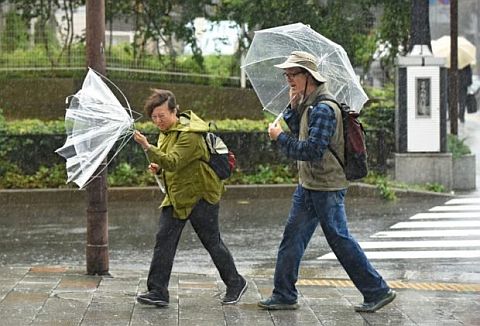
A woman’s umbrella turned inside out with strong wind in Tokyo on Sunday. A powerful typhoon barreled toward Japan with heavy rain triggering landslides and delaying voting at one ballot station as millions struggled to the polls for a national election. /AFP
A powerful typhoon barreled toward Japan on Sunday, prompting Prime Minister Shinzo Abe to order his government on alert as millions struggled to the polls for a national election.
Typhoon Lan, described as “very large and very strong” by Japan’s meteorological agency, was packing gusts up to 216 kilometers per hour Sunday afternoon in the Pacific south of Japan.
The storm, which has already lashed large areas of the Japanese archipelago, was moving northeast and may hit Tokyo or surrounding regions Monday morning.
Strong winds forced airline companies to ground more than 380 flights, while some train and ferry services in western Japan were canceled due to the storm, local media said.
Abe ordered his minister in charge of disasters to be ready to mobilize rescue and evacuation forces, including troops.
“In order to protect people’s lives, the Abe cabinet will unite and do its best to provide an emergency response to a disaster,” he told reporters.
Several local governments in Osaka and other prefectures issued evacuation advisories, urging residents living near the coast, rivers and hillsides to move to shelters.
The weather agency separately warned of high waves, landslides and floods in central and western Japan.
Voters in the capital braved torrential rain and driving wind on election day, as opinion polls indicate Abe is on course for a comfortable win.
Analysts say that if the weather affects turnout, it is likely to benefit Abe, whose conservative voters are seen as more determined to cast their ballots.
Voting was delayed by some 20 minutes in Kochi in western Japan when landslides blocked a road.
Ferries to a remote island in the west were canceled due to high waves, forcing election officials to suspend the counting of votes there.
On Saturday, voters on remote southern islands in the path of the storm had cast their ballots early, heeding a call from Abe.
Disclaimer: The comments uploaded on this site do not necessarily represent or reflect the views of management and owner of Cebudailynews. We reserve the right to exclude comments that we deem to be inconsistent with our editorial standards.
